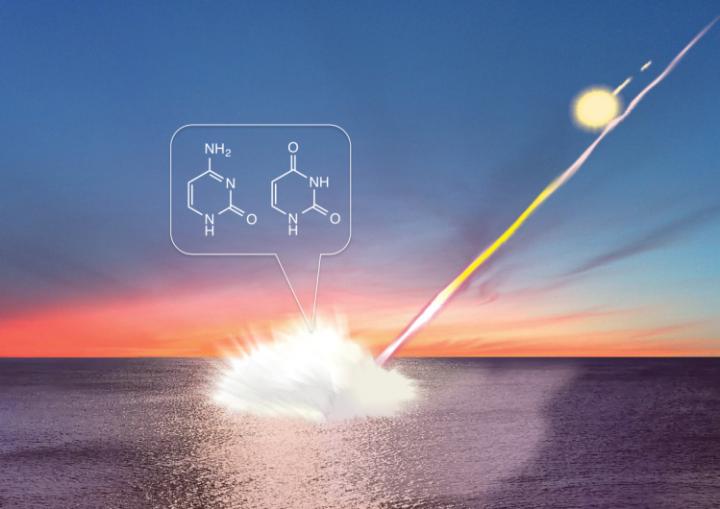Meteorite impacts can create DNA building blocks

Figure 1: These are chematics of nucleobases formation by meteorite impact on earth. Credit Dr. Yoshihiro Furukawa
With precise analysis of the products recovered after impacts, the team found the formation of nucleobases and amino acids from inorganic compounds. The research is reported this week in the journal Earth and Planetary Science Letters.
All the genetic information of modern life is stored in DNA as sequences of nucleobases. However, formation of nucleobases from inorganic compounds available on prebiotic Earth had been considered to be difficult.
In 2009, this team reported the formation of the simplest amino acid, glycine, by simulating meteorite impacts. This time, they replaced the carbon source with bicarbonate and conducted hypervelocity impact experiments at 1 km/s using a single stage propellant gun (Figure 2).
They found the formation of a far larger variety of life's building blocks, including two kinds of nucleobases and nine kinds of proteinogenic amino acids. The results suggest a new route for how genetic molecules may have first formed on Earth.
###
Publication Details
Title: Nucleobases and amino acids formation through impacts of meteorites on the early ocean.
Authors: Furukawa Y., Nakazawa H., Sekine T., Kobayashi T., Kakegawa T.
Journal: Earth and Planetary Science Letters (2015), http://dx.
Contacts:
Dr. Yoshihiro Furukawa
Assistant Professor, Department of Earth Science, Tohoku University
Email: furukawa@m.tohoku.ac.jp
Tel: +81-22-795-3453
Dr. Takamichi Koybayashi
Principal Researcher, Ultra-High Pressure Processes Group
Materials Processing Unit, National Institute for Materials Science
Email: KOBAYASHI.Takamichi@nims.go.jp
Tel: +81-29-860-4419
Dr. Toshimori Sekine
Professor, Department of Earth and Planetary System Science, Hiroshima University
Email: toshimori-sekine@hiroshima-u.ac.jp
Tel: +81-82-424-7474
Media Contact
All latest news from the category: Earth Sciences
Earth Sciences (also referred to as Geosciences), which deals with basic issues surrounding our planet, plays a vital role in the area of energy and raw materials supply.
Earth Sciences comprises subjects such as geology, geography, geological informatics, paleontology, mineralogy, petrography, crystallography, geophysics, geodesy, glaciology, cartography, photogrammetry, meteorology and seismology, early-warning systems, earthquake research and polar research.
Newest articles

A ‘language’ for ML models to predict nanopore properties
A large number of 2D materials like graphene can have nanopores – small holes formed by missing atoms through which foreign substances can pass. The properties of these nanopores dictate many…

Clinically validated, wearable ultrasound patch
… for continuous blood pressure monitoring. A team of researchers at the University of California San Diego has developed a new and improved wearable ultrasound patch for continuous and noninvasive…

A new puzzle piece for string theory research
Dr. Ksenia Fedosova from the Cluster of Excellence Mathematics Münster, along with an international research team, has proven a conjecture in string theory that physicists had proposed regarding certain equations….



